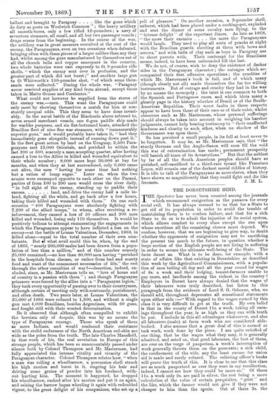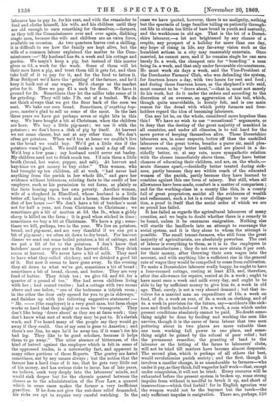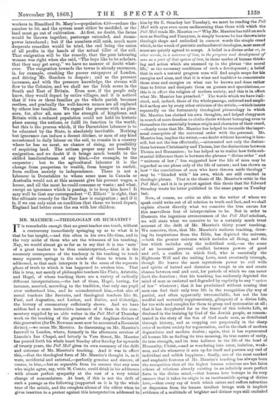THE DORSETSHME HIND.
THE Spectator has never been counted among the journals which recommend emigration as the panacea for every
social evil. It has always seemed to us that for a State to get rid of its population in order to avoid the trouble of maintaining them is to confess failure, and that for a rich State to do so is to admit the injustice of its social system, which allows comfort to every class except the one upon whose exertions all the remaining classes must depend. We
confess, however, that we are beginning to give way, to doubt whether the opponents of emigration may not be sacrificing the present too much to the future, to question whether Sr large section of the English people are not living in suffering in order to secure the ultimate well-being of the State. The facts daunt us. What is to be done, for example, with a state of affairs like that existing in Dorsetshire as described this week by the Agricultural Commissioners, with a popula- tion of men toiling all day and all the year round for wages of 8s. a week and their lodging, tenant-farmers unable to pay more, and landlords among the richest in the country Employers in Dorset have always denied that the wages of their labourers were truly described, but listen to this paragraph from the evidence of Lord S. G. Osborne, who, we should add, throughout deprecates all sensational statements upon either side :—" With regard to the wages earned by this class it is very difficult to get at the truth. My own belief is that in the county of Dorset 11s. a week, taking all earn- ings throughout the year, is as high as they can with truth be put. I include in this all advantages whatsoever, and also all labourers (male) at farm work who are considered able- bodied. I also assume that a great deal of this is earned at task work, work done by the piece. I am quite satisfied of one thing, that be the wages what they may, it is generally admitted, and acted on, that good labourers, the best of them, are ever on the verge of pauperism, a week's interruption of work generally throws them on the poor-rate; a sick child, the confinement of the wife, any the least excuse for union aid is made and rarely refused. The relieving officer's books will prove the truth of this. It is clear to me that this class are as much pauperized as ever they were in my recollection, indeed, I cannot see how they could be more so." Of these us, a week only 9s. are paid in silver, the rest being a mere calculation of the value of certain perquisites, " grist " and the like, which the farmer would not give if they were not cheaper to him than the specie. Out of these Os. the labourer has to pay le. for his rent, and with the remainder to feed and clothe himself, his wife, and his children until they are old enough to earn something for themselves,—farmers, as they tell the Commissioners over and over again, disliking single men, because the wife and children are an extra force, available on occasion. As two quartern loaves coat a shilling, it is difficult to see how the family are kept alive, but the wife of a common labour explained the matter to the Com- missioners :—" My husband has es. a week and his cottage and garden. We mayn't keep a pig, but instead of this master gives us 6d, a week for the wash. Some of them will let their men have a pig, and trust them till it gets fat, and then take half of it to pay for it, and for the food to fatten it. Near Bridport we'd have the gristing' of the farmer, and he'd keep it back out of our wages. He'd. charge us the market price for it. Here we pay £1 a sack for flour. We have it ground for 2s. Sometimes they let the miller take some of it for grinding. They will take 7 lb. out of a bushel. We do not think always that we get the flour back of the corn we sent. We bake our own bread. Sometimes, if anything hap- pens, master's glad to sell us some of the meat. In the last three years we have got perhaps seven or eight bits in this way. We have bought a bit at Christmas, when the children are here. We buy a little pig-meat ; we use it with the potatoes ; we don't have a dish of pig by itself. At harvest we eat some cheese, but not at any other time. We don't often get potatoes. When we'd ten at home we couldn't live on the bread we could buy. We'd get a little rice if the potatoes wasn't good. We could make a meal a day off rice. We'd buy a few peas ; my husband could never eat barley. My children used not to drink much tea. I'd mix them a little broth (bread, hot water, pepper, and salt). At harvest and hay-time we get money to buy cider." This woman, who had brought up ten children, all at work, "had never had -anything from the parish in her whole life," and gave her evidence without bitterness, relating facts to the credit of her employer, such as his permission to cut furze, as plainly as the facts bearing upon her own poverty. Another woman, wife of a shepherd in Blandford, whose husband is a little better off, having 108. a week and a house, thus describes the diet of her home :—" We don't have a bit of butcher's meat not for half a year, not from Christmas to Christmas ; we sometimes get a bit of mutton at 3d. the lb., when a giddy sheep is killed on the farm ; it is good when sticked in time ; sometimes we buy a bit at Christmas. We have a pig ; some- times we kill, perhaps, two in the year. We live on potatoes, bread, and pig-meat, and are very thankful if we can get a bit of pig-meat ; we often sit down to dry bread. For harvest
• dinner we send out some boiled potatoes, a bit of cabbage, and we put a bit of fat to the potatoes. I don't know that butchers' meat ever goes out to the harvest-field. They drink cocoa at harvest. We never have a bit of milk. They used to have what they called chickory, and we drinked a good bit of it. But now it seems to have gone away. In the evening they sit down to what we've got, sometimes a bit of bread ; sometimes a bit of bread, cheese, and butter. They are very fond of butter. They drink tea ; we give 6d. and 8d. for a quarter of a pound of tea." She had seven children living with her ; had reared twelve ; had a cottage with two rooms above and one below, "one of the bedrooms a tidyish room ; in the other the door only opened for you to go in sideways," and finishes up with the following suggestive statement :— "Mr. — (the employer) is a very good man, but farm chaps works so hard that they might as soon be transports.' They don't like being drove about' as they are at farm work ; they don't know what sort of work they may be put to. It's slavish work, and I've heard many of the people say they would go away if they could. One of my sons is gone to America ; and there's our Jim, he says he'd be away too, if it wasn't for his bad leg. They like to be good scholars, because it helps them to go away." The utter absence of bitterness, of the kind of hatred against the employer which is felt in some of the oppressed trades, is a noteworthy fact, and apparent in mapy other portions of these Reports. The gentry are hated sometimes, not by any means always ; but the notion that the farmer has a hard time of it too, that he gets very little out of his money, and has serious risks to incur, has of late years, we believe, sunk very deeply into the labourers' minds, and would sink deeper but for the chronic quarrel between the classes as to the administration of the Poor Law, a quarrel which in some cases makes the farmer a very inefficient guardian. If he does not give the out-door relief demanded, his ricks are apt to require very careful watching. In the
cases we have quoted, however, there is no malignity, nothing but the spectacle of large families toiling on patiently through- out life to obtain too little of bare bread in youth and maturity, and the workhouse in old age. That is the lot of a Dorset. shire labourer,—a lot not brightened by any chance of a respite, any prospect of a holiday for more than one day, any hope of rising in life, any far-away vision such as the humblest artisan in a city may reasonably entertain. Once married, he cannot save, and if he remains single he can save barely 2s. a week, the cheapest rate for " boarding " a man being 5s. a week, and that only under favourable circumstances. He must work six days a week, said the Vice-President of the Dorchester Farmers Club, who was defending the system, for fourteen hours a day, with two hours for rest and food ; and during those fourteen hours, as the shepherd's wife said, must consent to be "drove about,"—that is, must not merely do his work, but do it under the orders and according to the discretion of an overseer, an aggravation of his toil, which, though quite unavoidable, is keenly felt, and is one main reason for the dread with which petty farmers and free- holders regard the idea of becoming labourers.
Can any lot be, on the whole, considered more hopeless than this? We have no wish to use " sensational " arguments, or to deny that the destiny of the great majority of mankind in all countries, and under all climates, is to toil hard for the mere power of keeping themselves alive. These Dorsetshire labourers are, in some respects, better off than the unskilled labourers of the great towns, breathe a purer air, amid plea- santer scenes, enjoy better health, and are placed in a de- cidedly better, or, at any rate, more sympathetic relation with the classes immediately above them. They have better chances of educating their children, and are, on the whole,— acute diseases apart,—decidedly better treated during sick- ness, partly because they are within reach of the educated women of the parish, partly because they have learned to combine against this one form of misery. But still, when all allowances have been made, comfort is a matter of comparison ; and for the working-class in a county like this, in a county full of great proprietors, amidst all the evidences of wealth and refinement, such a lot is a cruel disgrace to our civiliza- tion, a proof in itself that the social order of which we are so proud has failed.
It has failed as regards the agricultural labourers of many counties, and we begin to doubt whether there is a remedy to be found, unless it be enormous emigration. Nothing else will startle the landlords into an attempt to rearrange the social system, and it is they alone to whom the attempt is possible. The small tenant-farmers, who still form the great majority of agriculturists, are absolutely powerless. The cost of labour is everything to them, as it is to the employers in some manufactures' they do not even now obtain 8 per cent. for their money, after throwing their own wages into the account, and with anything like a sufficient rise in the general rate of wages they would be compelled to cease from cultivation. To make a Dorsetshire labourer really happy, he ought to have a four-roomed cottage, costing at least £75, and, therefore, after due allowance for repairs, rented at 2s. a week ; ought to have meat once a week and milk every day, and ought to be able to lay by sufficient money to give him 4s. a week in old age. That, surely, is not a very absurd demand ; but that in- volves for a married man an expenditure of 10s. a week on food, of 2s. a week on rent, of 2s. a week on clothing, and of 4s. a week in provision for the future, say—accidents like sick- ness and death included—of 18s. a week, a sum which under present conditions absolutely cannot be paid. No doubt some- thing might be done by feeding and working the men like navvies, though it is the muse of farm labour that two men pottering about in two places are more valuable than one man working full power in one place, and some- thing might be gained by the refusal of poor relief ; but the permanent remedies, the granting of land to the labourer or the letting of the farms to labourers' clubs, will not be tried till matters have become almost desperate. The second plan, which is perhaps of all others the best, would revolutionize parish society ; and the first, though it involves a smaller change, is so unendurable to farmers—who under it pay, as they think, full wages for half work—that, except under compulsion, it will not be tried. Every resource will be exhausted before the present system is broken up, some strong impulse from without is needful to break it up, and short of insurrection—which God forbid! for in English agrarian war the weapon would not be the bayonet but the torch—the only sufficient impulse is emigration. There are, perhaps, 150 workers in Blandford St. Mary's—population 450—reduce the number to 50, and the system must either be modified, or the land must go out of cultivation. At first, no doubt, the farms would be thrown together, pasturage extended, and steam- power introduced ; but if the numbers still sank, much more desperate remedies would be tried, the end being the union of all profits in the hands of the actual tiller of the soil. That emigration will be the remedy, that the poor labouring woman was right when she said, "The boys like to be scholars, that they may get away," we have no manner of doubt what- ever. The emigration towards the towns is already enormous, is, for example, crushing the poorer ratepayers of London, and driving Mr. Goschen to despair ; and as the pressure increases, and with the pressure knowledge, the stream will flow to the Colonies, and we shall see the Irish scene in the South and East of Britain. Even now, if the people only knew, they would depart by entire villages, and it is noticed that if two or three families go the whole parish becomes restless, and gradually the well-known names are all replaced by others less familiar. We regard the process with no plea- sure, for, after all, men are the strength of kingdoms, and Britain with a reduced population could not hold its historic place among the nations, or fulfil its function in the world; but this is the process which, if the Dorsetshire labourer is to be educated by the State, is absolutely inevitable. Nothing but ignorance can induce a decent ditcher, or man of any kind accustomed to daily labour on the soil, to remain in a country where he has no meat, no chance of rising, no possibility of acquiring land. The artisan proper may not benefit by emigration, and we doubt if it brings much benefit to the skilled handicraftsman of any kind,—for example, to the carpenter ; but to the agricultural labourer it is the change from pauperism to wealth, from hunger to surfeit, from endless anxiety to independence. There is not a labourer in Dorsetshire to whom some man in Canada or Australia would not at this moment give his present wages, a house, and all the meat he could consume or waste ; and what, -except an ignorance which is passing, is to keep him here ? It may well be that our correspondent "C. Elliott" is right, that the ultimate remedy for the Poor Law is emigration ; and if it is, if we can only exist on condition that those we breed depart, England had better cross the sea with her children.




































 Previous page
Previous page